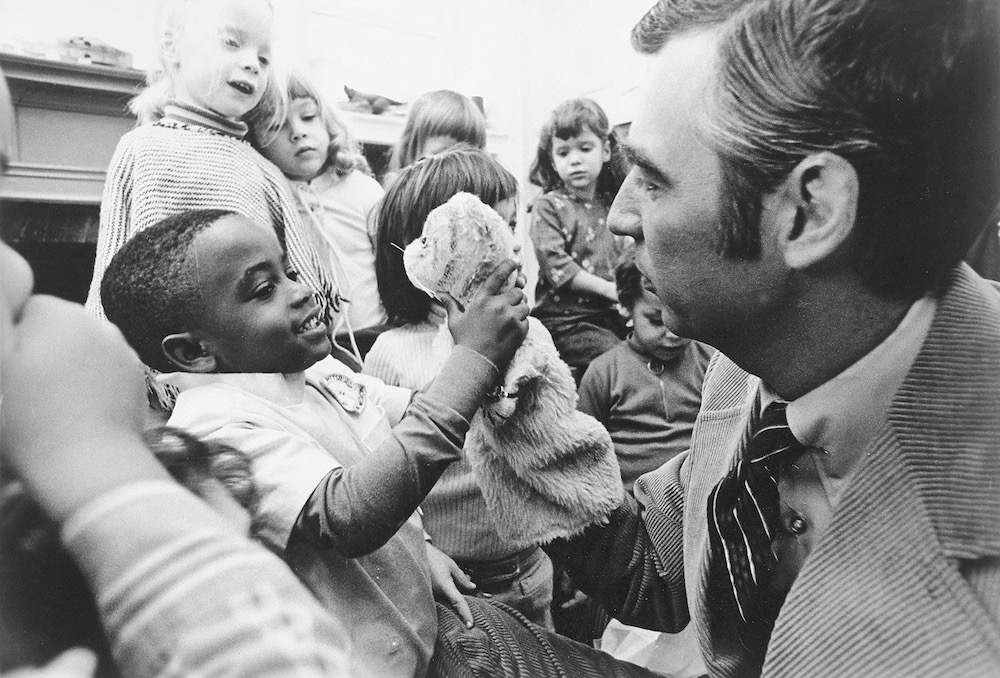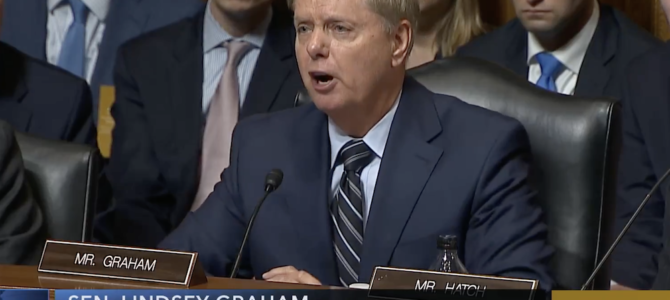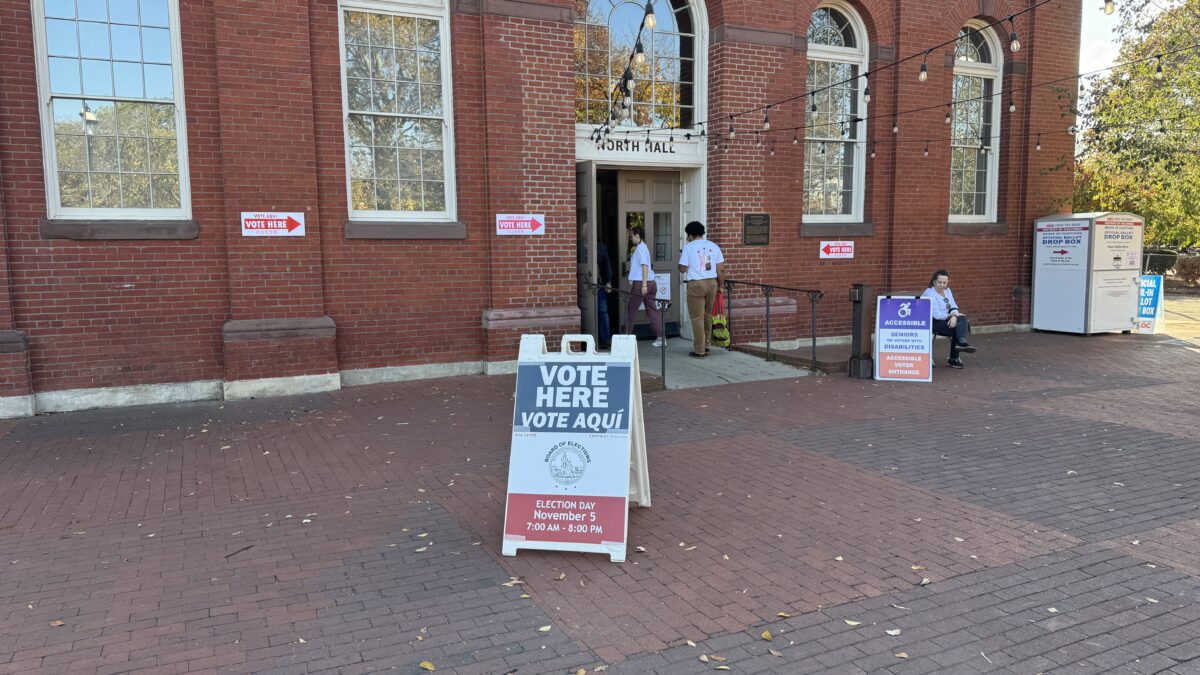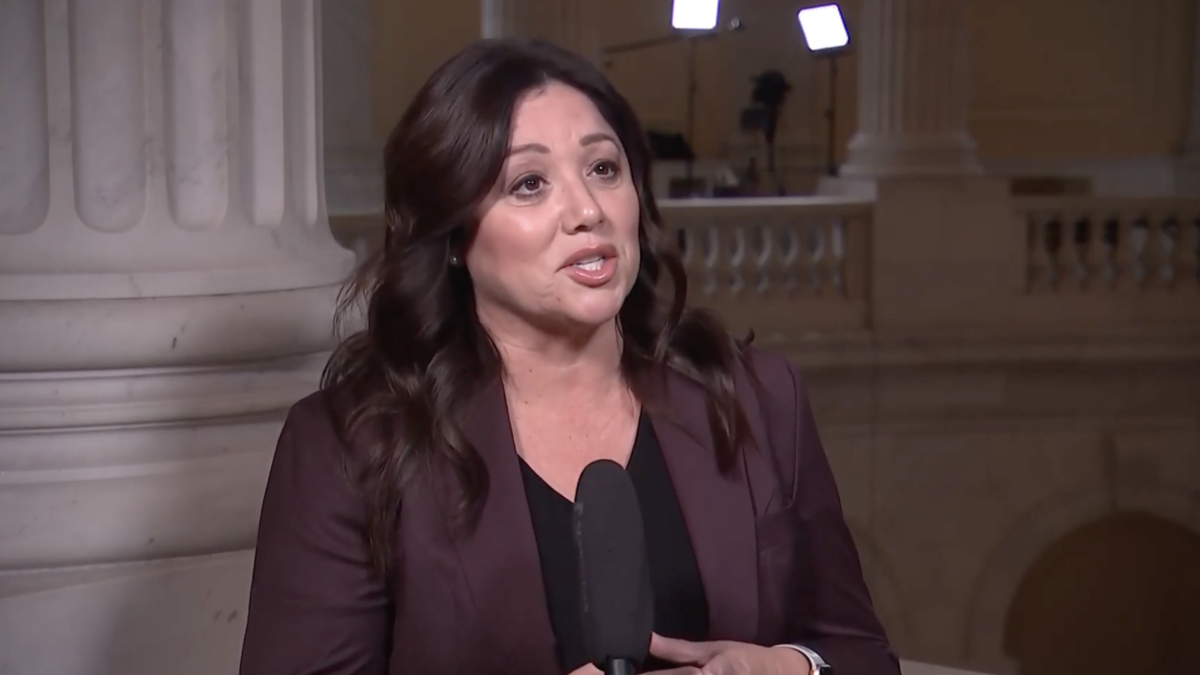
When renowned TV personality Fred Rogers came to western New York in 1986 to talk about family and relationships, a thousand people showed up to hear his wisdom. But all he cared about was connecting with the one.
Following brief remarks, Rogers opened the floor for questions. A woman in the fifteenth row stood up and haltingly spoke into a microphone handed to her. “Mister Rogers, our daughter is now a young adult,” she said. “She always watched your program, as did I. She now —“ the woman broke down, sobbing.
The audience remained silent, unsure how to respond. “She’s going through a very painful divorce and I …” Emotions again overwhelmed her. Rogers knew what she needed, recalls his friend George Wirth who watched the scene unfold.
“He climbs down from the stage, goes to the row she’s sitting in, inches all the way across and looks at her face-to-face,” recounts Wirth. “Then he puts his arms around her and hugs her. It wasn’t for the audience; he was doing that for her. I’ve never seen anyone do anything like that.”
String together 94 minutes of compelling human moments like this and it gives you “Won’t You Be My Neighbor,” the rare documentary that Focus Features is rolling out to wide national release this summer. With a trailer that hit over 20 million views online in just two months — unheard of for a doc — many predict it will hit big.
Reviews could not be more positive. “Moving and illuminating,” extols The New York Times. “Radically subversive,” opines Vox. Then there’s one blurb Rogers, an ordained minister, would surely find puzzling: “Watching this movie is like freebasing sincerity — a scarce resource in our current entertainment hellscape,” writes Village Voice. “It’ll give you warm fuzzies for days.”
In our polarized era, such mainstream praise is often reserved for flicks calling for “resistance” rather than one centered on a children’s educator identified in the film as a “lifelong registered Republican.” Yet Fred Rogers was always a countercultural figure who defied political labels.
Of Puppets And Plain-Spoken Principles
Several generations of Americans (including this one) grew up on “Mister Rogers’ Neighborhood,” a half-hour children’s educational show known for its simple sets, expressive puppets and welcoming slow pace. Some will, no doubt, chalk up the documentary’s appeal solely to nostalgia.
As the first project since Rogers’ 2003 death to feature his widow Joanne Rogers and their sons, the film offers much more than a look back. “Won’t You Be My Neighbor?” takes a deep dive into the show and its ethos, uncovering how and why Fred Rogers offered a singular approach to edutainment.
His simple style belied the depth of what Rogers put into the series as head writer, music composer, puppeteer and live-action star. He earned degrees in music and theology, with extensive research in child psychology. Dismissed at times as out-of-touch, Rogers and his “Neighborhood” boldly challenged the culture around him.
“Fred Rogers was a very truthful person,” says George Wirth, who is featured in the film. “Honesty came through him in every way, shape and form. America needs that kind of truth-telling today.” This included presenting truths about contentious societal issues at the time.
“Mister Rogers’ Neighborhood” premiered nationally on Feb. 19, 1968, only two months before the assassination of Dr. Martin Luther King, Jr. In the wake of his violent death, King’s civil rights message of human dignity for all began to gain wide acceptance. Yet Rogers knew vestiges of racism remained in some neighborhoods.
When he met up-and-coming black singer François Clemmons, Rogers made a bold proposal: would you join the show as a police officer? “I grew up in the ghetto,” recounted Clemmons in an NPR interview. “I did not have a positive opinion of police officers. Policemen were siccing police dogs and water hoses on people. So I was not excited about being Officer Clemmons at all.”
The film briefly shows footage from this era, including a man pouring dangerous chemicals into a pool where black children are playing. Starting with Clemmons, who had a starring role for 25 years, the children’s show showcased ethnic diversity. Clemmons soon embraced the role, which amplified his singing career.
“Fred had a way of getting these ideas across,” said Clemmons. “It showed [audiences] that two people from racially different backgrounds and different ages — he was some 20 years older than I am — can be dear, special friends.”
When Mister Rogers Quit, Superman Brought Him Back
By 1976, “Mister Rogers’ Neighborhood” had become a mainstay on the fledgling PBS network with 460 color episodes completed. Rogers planned to move on to other creative endeavors, figuring his kids’ show would live on in reruns.
Early episodes had covered a range of preschool topics such as fear, fire safety, the death of a goldfish, what it means for parents to be married, anger and the birth of a sibling. In 1978, Rogers produced a PBS variety show wherein he interviewed figures in the arts, politics and sports. The short-lived project was intended to reach beyond children.
Then, that Christmas season, “Superman: The Movie” blasted into theaters. Earning $300 million worldwide, the film starring Christopher Reeves marked the first of Hollywood’s superhero blockbusters — with promotional tie-ins blitzing retailers and TV screens.
Yet children were susceptible to the frenzy in ways ad executives never considered. “Children were trying to fly because of Superman,” says Peggy Kellers, a volunteer counselor who serves at a Washington, D.C. church. “When he saw headlines of children dying from attempts to fly, Mister Rogers countered that with truth and reality.”
New episodes of “Neighborhood” soon returned, with a weeklong focus on superheroes prominently featured. In 22 years of further production, Rogers continued to broach relevant topics with young audiences such as extreme weather events, why parents go to work, divorce and handling conflict.
“Children need to have a secure, loving environment in which they can learn to safely express their emotions — joys, sadness, anger, fears,” says Kellers. “Mister Rogers was very effective in not only being able to express emotions authentically, through puppets or himself, but also to know what children may be sensing.”
In a world where IQ is paramount, Rogers emphasized EQ — emotional quotient. “The earlier children learn to express their emotions effectively, the more they will be able to adjust as they mature and face the challenges of life,” she concludes.
During Rogers’ four decades on-air, other children’s shows became more crude and degrading to young audiences. Though rarely critical in public, Rogers and his friend Reverend George Wirth often conversed about using television for good. “He used to really painfully talk about the way other people were doing children’s television,” says his former pastor.
“I just don’t want to have that kind of chaos,” confessed Rogers. “We want to really minister to these children.”
Affirming The Image of God In Every Person
“Won’t You Be My Neighbor?” does not shy away from Fred Rogers’ Christian faith. In the documentary, Wirth recounts one spiritual truth he learned from the mild-mannered children’s TV host.
“Early in our friendship, he made a profound statement,” says Wirth, whom Rogers befriended in 1983. “Speaking of children who heard him through television, he said: ‘Between my mouth and those who hear, that space is holy ground.’ He believed God took his words and blessed them as they are on their way to the hearing audience.”
The spiritual insight impacts Wirth to this day. “Every time that I preach now, in fact nearly every day, I think about those words,” he says.
A graduate of Pittsburgh Theological Seminary, Rogers was likely the most well-known Presbyterian minister of his time. “He didn’t go around tooting his own horn,” says Wirth. “Fred was ordained because he wanted ‘Mister Rogers’ Neighborhood’ to be his ministry. Faith was what shaped his words, his actions and his heart.”
Both Wirth and Rogers were affiliated with the Presbyterian Church when a denominational split occurred in 1973. They stayed with the branch known as the Presbyterian Church in the United States (PCUSA), generally viewed as theologically liberal. Wirth addresses the substance of the split only in passing.
“It’s painful to me, as it was painful to Fred, to see people leave because of differences of opinion,” says Wirth. “I’ve preached the Bible for 40 years as an ordained minster. I have learned to try not to argue with anybody about [issues like] the interpretation of the Bible. I’d rather talk with people about Jesus, his teachings and his miracles — and let that become the main thing.”
On the TV show, Rogers’ views of marriage and sexuality remained more aligned with orthodox Christian views than recent shifts in the PCUSA denomination. His song “Everybody’s Fancy,” which emphasized gender differences of boys and girls, was heard in over 50 episodes and continued to air on PBS through 2008.

Rogers had his critics on other issues. Years following his passing, a Texas minister questioned the show’s legacy in a widely read article. “He criticized Mister Rogers for elevating children to be special,” says Wirth. “He felt it was the same idea where, if they’re on a soccer team, they all get trophies as the best athlete.”
Using clips from one of dozens of college commencement speeches he gave, the film addresses what Rogers meant by calling every child special. “You don’t ever have to do anything sensational in order to love or to be loved,” Rogers said to graduates. His words echo core tenets of the Christian gospel: grace and unconditional love.
Wirth himself wrote to the accusing minister, though he never heard back. “If we believe that God created us and we are in the image of God, tell me that’s not special,” he says today. “It is special beyond description.”
Humor And Honesty That Cuts To The Heart
Behind the scenes, production crew on the show kept the attitude light and often pulled pranks. Their antics are what landed the new documentary a PG-13 rating.
A crew member enjoyed pilfering any still camera lying around on-set and taking a picture of him mooning the camera. When he did it with the boss’ camera, he heard no response for months. Then at a Christmas party, Rogers showed up with a massive framed print for the crew member — the man’s bare butt front and center.
“Fred set a joyful tone, and it was contagious,” says George Wirth, who often visited the Pittsburgh studio during filming. “People loved to laugh around him, cameramen included.”
The simplicity and openness of Fred Rogers, on the TV show and off-camera, have an impact on today’s cynical audiences. At a Washington, D.C., screening with diverse ethnicities and generations, by the end there was not a dry eye in the theater. “When we sat back to watch the final mix, I started crying,” said director Morgan Neville in a recent interview. “And I’d made it!”
Prior to this, Neville’s most recent movie was about conservative icon and National Review founder William F. Buckley. “I actually feel like [Rogers] is kind of a good antidote to cynicism,” he continues. “Ultimately, he is going to get beyond your adult defenses and ask some question that’s going to get to the core of what it is you really are grappling with.”
Expect the cultural buzz surrounding everyone’s favorite caring, corny puppeteer to only get louder. Sony Pictures has announced a biopic entitled “You Are My Friend,” starring Tom Hanks as Fred Rogers, which will begin shooting this September and premiere in October 2019.
The documentary has come along at a time society needs it, contends Wirth. “We are a divided nation in so many ways,” he says. “I’m not making a political statement here — we are losing civility. Kindness is not on the front burner for a lot of us. People are hurting each other.”
“This movie reminds America that faith, joy, love and hope are the things that bind people together in unity.”
“Won’t You Be My Neighbor?” releases in select theaters on June 15, and nationwide on June 22.









